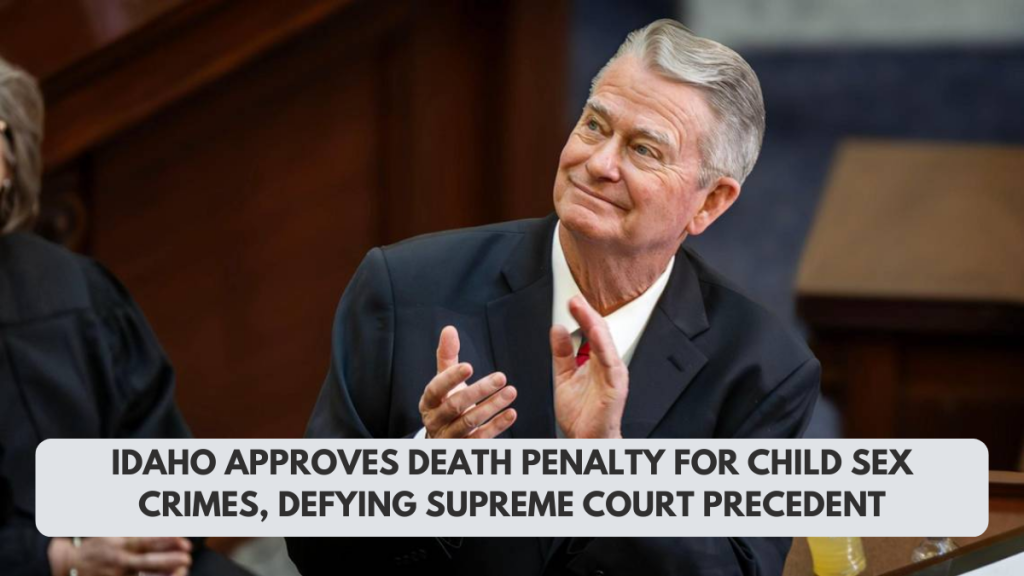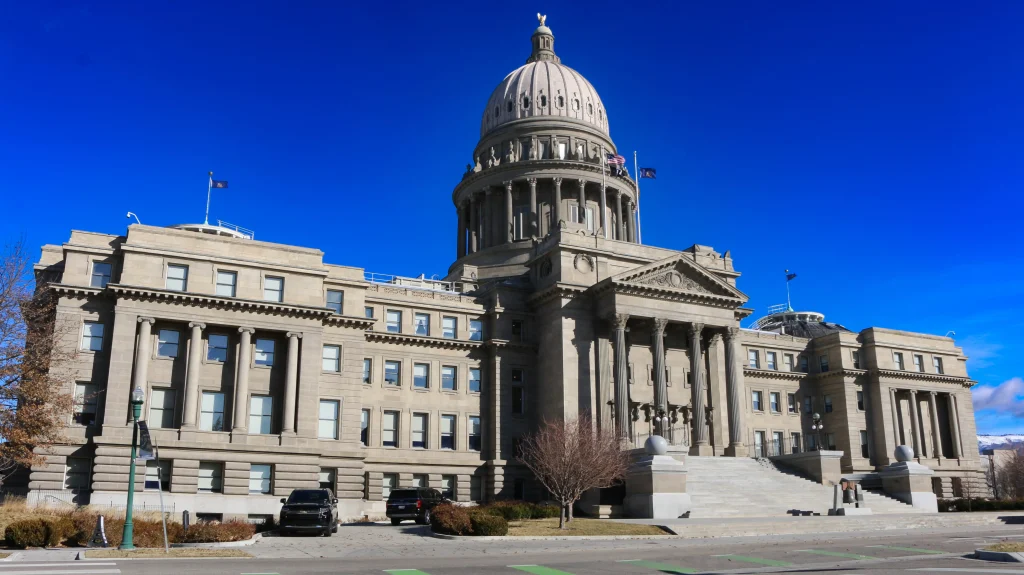
In a bold and controversial move, Idaho has become the first U.S. state to expand the death penalty to include certain cases of child sexual abuse. Governor Brad Little signed House Bill 380 into law in March 2025, allowing prosecutors to seek the death penalty for individuals convicted of aggravated lewd conduct with children aged 12 and younger.
The legislation has stirred national debate, as it directly challenges a 2008 U.S. Supreme Court ruling that deemed the death penalty unconstitutional for child rape when the victim does not die.
What the New Law Does?
The newly signed House Bill 380 creates a new criminal charge for aggravated lewd conduct with a minor under 16, and introduces enhanced sentencing—including mandatory minimum prison terms and eligibility for capital punishment—for the most egregious cases.
Under the law, an individual can face the death penalty if three or more aggravating factors are proven in court. These include:
- Previous convictions requiring sex offender registration
- Multiple offenses against the same victim
- Use of force, threats, or coercion
- Abuse involving a position of trust or authority
- Penetration or physical injury
- Use of weapons
- Kidnapping or trafficking of the victim
- Evidence of torture or prolonged abuse
This legislative effort aims to impose harsher penalties for predators who commit the most severe forms of abuse against children.
The full text of House Bill 380 can be accessed on the Idaho State Legislature website.
A Direct Challenge to Supreme Court Precedent

The law faces an uphill legal battle, as it appears to directly contradict the U.S. Supreme Court’s 2008 decision in Kennedy v. Louisiana, which ruled 5-4 that the death penalty for child rape violates the Eighth Amendment’s prohibition on cruel and unusual punishment—when the victim does not die.
However, Idaho lawmakers behind the bill argue that the court’s current conservative majority may be more willing to reconsider that precedent.
“We are well aware this will be challenged in court,” said Rep. Bruce Skaug (R-Nampa), who sponsored the bill. “But we believe this is a fight worth having. Some crimes are so heinous that they deserve the ultimate punishment.”
You can read the Kennedy v. Louisiana opinion on the official Supreme Court website.
Political and Public Reaction
The bill received bipartisan support in Idaho’s House and Senate, reflecting widespread concern over child abuse cases in the state and nationwide. Victim advocacy groups have praised the legislation, calling it a step toward justice for survivors.
However, civil liberties groups and some legal scholars have criticized the law, arguing it sets a dangerous precedent and may deter victims from reporting abuse, especially if the abuser is a family member.
The American Civil Liberties Union (ACLU) of Idaho has voiced strong opposition, stating, “This law flies in the face of binding Supreme Court precedent and may ultimately be ruled unconstitutional.”
Idaho and the Firing Squad
In a related move, Idaho recently authorized the firing squad as its primary method of execution. This came after years of difficulty obtaining lethal injection drugs due to pharmaceutical companies refusing to supply them for capital punishment.
Governor Little signed that law in early March, making Idaho the first state to prioritize the firing squad as an execution method. The Idaho Department of Correction (IDOC) is now required to prepare a facility to carry out executions by firing squad. More information is available on the IDOC official website.
Who Is on Death Row in Idaho?

As of April 2025, Idaho has nine inmates on death row, according to the Idaho Department of Correction. The last execution in the state occurred in 2012. Future executions under the new law will likely be subject to years of litigation before being carried out.
You can view the list of death row inmates here.
National Implications
Idaho’s bold move may influence other conservative-led states to consider similar legislation. Texas, Oklahoma, and Florida lawmakers have expressed interest in pursuing comparable policies, especially amid rising public concern over child exploitation crimes.
Yet legal experts caution that unless the U.S. Supreme Court reverses or modifies its previous ruling, such laws will likely face immediate injunctions and prolonged legal battles.
“This could become the next big showdown at the Supreme Court,” said Professor Emily Larson, a constitutional law scholar at the University of Idaho. “It’s not just about Idaho—it’s about whether states can reimpose the harshest penalty for crimes that don’t involve homicide.”
Final Thoughts
Idaho’s expansion of the death penalty signals a shift in criminal justice policy, one that puts it on a legal collision course with established federal jurisprudence. Whether the law will survive constitutional scrutiny remains to be seen, but the message from Idaho lawmakers is clear: the state intends to crack down hard on child predators.



